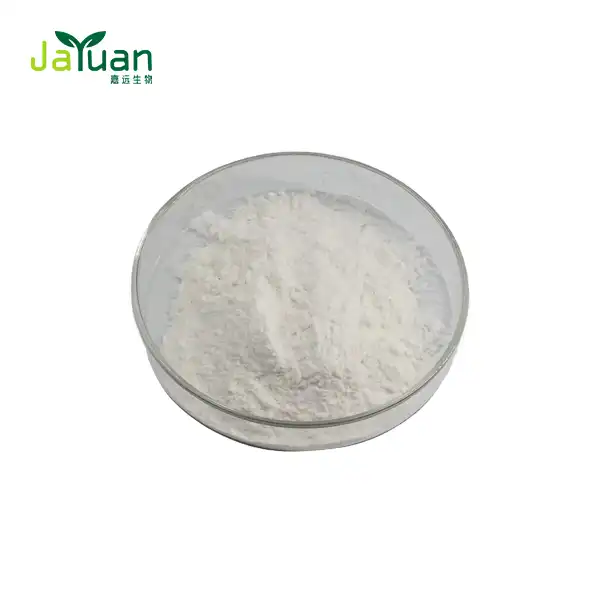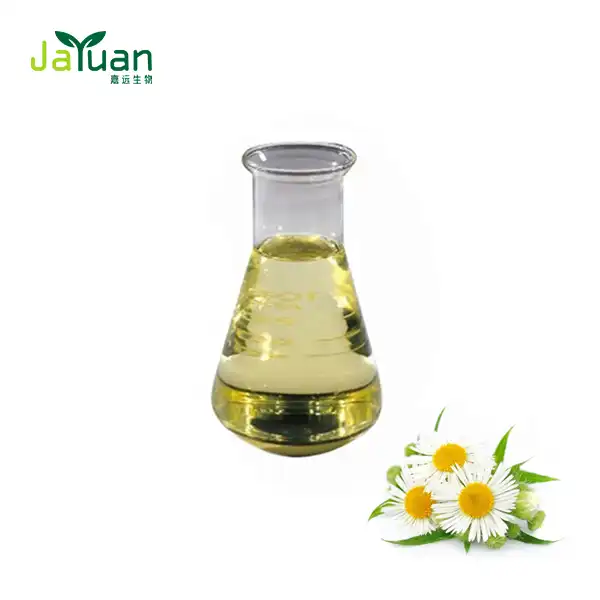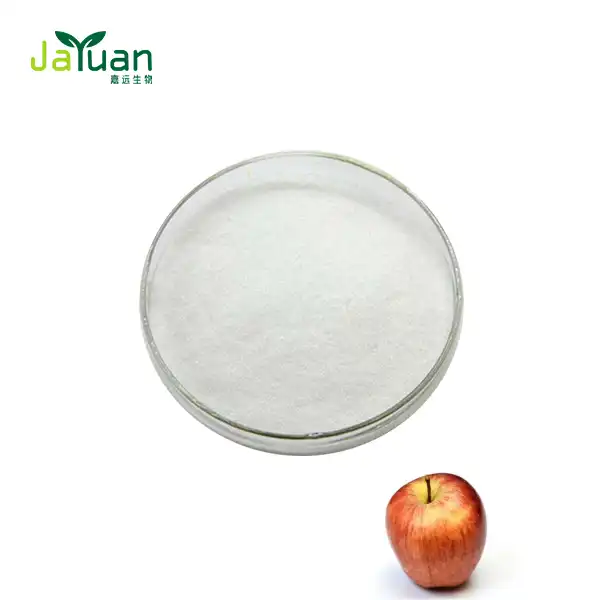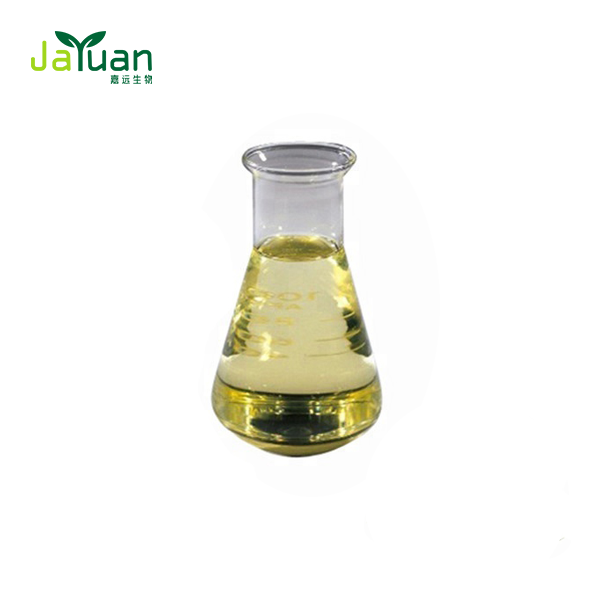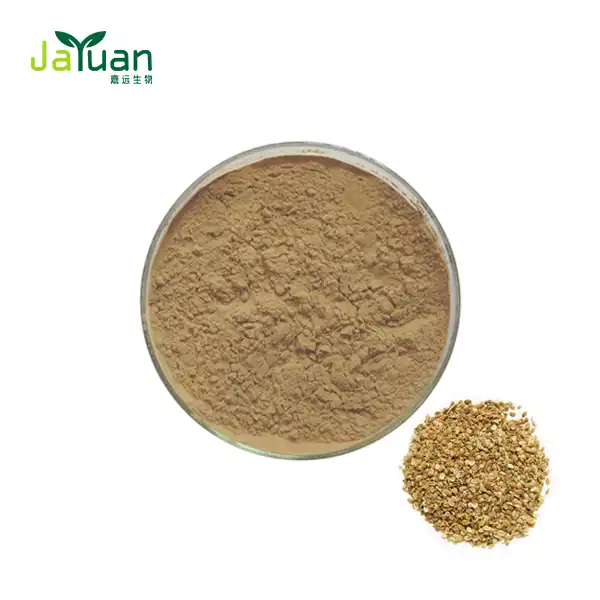Japanese Knotweed: A Potent Natural Source of Resveratrol
Japanese knotweed (Polygonum cuspidatum) has garnered significant attention in recent years as a rich, natural source of resveratrol powder. This powerful antioxidant compound has been linked to numerous potential health benefits, making it a sought-after ingredient in the nutraceutical and cosmetic industries. In this comprehensive guide, we'll explore the unique properties of Japanese knotweed, its extraction methods, and how it compares to other resveratrol sources.

Botanical source: Polygonum cuspidatum Sieb
CAS NO.: 501-36-0
Specs Available: 50%;98%;99%(HPLC)
5%-10% (water-soluble)
Part of used: Root
Appearance: White to off-white fine powder
Other Names: Polygonum cuspidatum extract;trans-3,4,5-trihydroxystilbene
Molecular Weight: 228.24
Molecular Formula: C14H12O3
Our Advantages: Scalable production capacity, strict quality control, cost efficiency from integrated factories, over 20 years of experience, advanced technology, and 24/7 after-sales support.
Certificaions: FSSC2000/ISO2000/HALAL/KOSHER/HACCP
Delivery terms: FedEx, DHL, EMS, UPS, TNT, all kinds of the airline, international shipping companies.
Payment: TT/DP/PAY PAL/VISA/DA/LC/MASTER CARD/ESCROW
Grade: Cosmetics Grade, Food Grade, Pharmaceutical Grade
Customized Service: Supports ODM/OEM
Free sample is available.
We do not sell retail quantities to individuals.
Extraction Methods: Maximizing Resveratrol Content
The process of extracting resveratrol from Japanese knotweed is crucial in determining the quality and potency of the final product. Various techniques have been developed to optimize the extraction process and ensure maximum yield.
Supercritical Fluid Extraction
Supercritical fluid extraction (SFE) has emerged as a cutting-edge method for isolating resveratrol from Japanese knotweed. This technique utilizes supercritical carbon dioxide as a solvent, which allows for efficient extraction without the use of harsh chemicals. SFE offers several advantages:
- High selectivity for resveratrol
- Low environmental impact
- Preservation of heat-sensitive compounds
- Rapid extraction times
The result is a pure, high-quality resveratrol powder that retains the natural potency of the compound.
Ultrasound-Assisted Extraction
Another innovative approach to resveratrol extraction is ultrasound-assisted extraction (UAE). This method employs high-frequency sound waves to disrupt plant cell walls, facilitating the release of bioactive compounds. UAE offers several benefits:
- Increased extraction efficiency
- Reduced solvent consumption
- Shorter processing times
- Preservation of temperature-sensitive compounds
UAE has shown promise in maximizing resveratrol yield from Japanese knotweed, making it an attractive option for resveratrol manufacturers.
Comparing Knotweed to Grape-Derived Resveratrol
While grapes and red wine are often associated with resveratrol, Japanese knotweed has emerged as a superior source of this valuable compound. Let's examine how knotweed-derived resveratrol compares to its grape counterpart.
Concentration and Purity
Japanese knotweed contains significantly higher concentrations of resveratrol compared to grapes. In fact, studies have shown that knotweed can contain up to 20 times more resveratrol than grape skins. This higher concentration translates to several advantages:
- More potent extracts
- Lower required dosages for potential health benefits
- Improved cost-effectiveness for manufacturers and consumers
Additionally, resveratrol extracted from Japanese knotweed tends to have a higher purity level, as the plant contains fewer interfering compounds compared to grapes.
Bioavailability and Stability
Research suggests that resveratrol derived from Japanese knotweed may have superior bioavailability compared to grape-derived resveratrol. This means that the body can more easily absorb and utilize the compound, potentially leading to enhanced health benefits.
Furthermore, knotweed-derived resveratrol has demonstrated greater stability in various formulations, making it an ideal choice for supplement manufacturers seeking to create products with extended shelf lives.
Sustainability: The Environmental Impact
As the demand for resveratrol powder continues to grow, it's essential to consider the environmental implications of its production. Japanese knotweed offers several advantages in terms of sustainability and ecological impact.
Invasive Species Management
Japanese knotweed is considered an invasive species in many parts of the world, causing significant ecological and economic damage. By utilizing this plant for resveratrol extraction, we can potentially turn an environmental problem into a valuable resource. This approach offers several benefits:
- Reduction of invasive plant populations
- Mitigation of ecological damage
- Creation of economic incentives for knotweed removal
By working with nature rather than against it, the resveratrol industry can contribute to environmental conservation efforts while meeting market demands.
Resource Efficiency
Compared to grape cultivation, Japanese knotweed requires fewer resources to grow and harvest. The plant is naturally resistant to pests and diseases, reducing the need for pesticides and other chemical interventions. Additionally, knotweed's rapid growth rate and ability to thrive in various climates make it an efficient crop for resveratrol production.
These factors contribute to a lower overall environmental footprint for knotweed-derived resveratrol compared to grape-based alternatives.
Potential Health Benefits of Resveratrol
While research is ongoing, resveratrol has been associated with various potential health benefits. It's important to note that these are not medical claims, and more studies are needed to fully understand the effects of resveratrol supplementation.
Antioxidant Properties
Resveratrol is renowned for its powerful antioxidant properties. It may help protect cells from oxidative stress and free radical damage, which are associated with various aspects of aging and cellular health.
Cardiovascular Support
Some studies suggest that resveratrol may promote cardiovascular health by supporting healthy blood pressure levels and improving circulation. These potential benefits have made resveratrol a popular ingredient in heart health supplements.
Cognitive Function
Emerging research indicates that resveratrol powder may have neuroprotective properties, potentially supporting cognitive function and brain health as we age. This has led to increased interest in resveratrol for brain health formulations.
Applications in the Nutraceutical and Cosmetic Industries
The versatility of resveratrol has led to its incorporation in a wide range of products across the nutraceutical and cosmetic sectors.
Dietary Supplements
Resveratrol is a popular ingredient in various dietary supplements, including:
- Anti-aging formulations
- Heart health supplements
- Antioxidant blends
- Sports nutrition products
The high purity and potency of knotweed-derived resveratrol make it an attractive option for supplement manufacturers seeking to create effective, high-quality products.
Skincare and Cosmetics
The antioxidant properties of resveratrol have also made it a sought-after ingredient in the cosmetic industry. It can be found in various skincare products, including:
- Anti-aging creams and serums
- Sun protection formulas
- Moisturizers and lotions
- Eye creams
Resveratrol's potential to support skin health and combat signs of aging has led to its increasing popularity in the beauty sector.
Conclusion
Japanese knotweed has emerged as a superior source of resveratrol, offering higher concentrations, improved purity, and enhanced sustainability compared to traditional grape-derived alternatives. As research continues to uncover the potential benefits of this powerful compound, the demand for high-quality resveratrol is likely to grow.
For nutraceutical and cosmetic manufacturers seeking to incorporate resveratrol into their products, Japanese knotweed-derived extracts offer a compelling solution. With advanced extraction methods ensuring optimal potency and purity, knotweed resveratrol represents a promising ingredient for a wide range of applications.
Call to Action
Are you looking to elevate your product line with high-quality, sustainably sourced resveratrol? Look no further than Xi'an Jiayuan Bio-Tech. As a leading resveratrol manufacturer, we offer premium Japanese knotweed-derived resveratrol powder that meets the highest standards of purity and potency.
Our state-of-the-art extraction methods, including supercritical fluid extraction and ultrasound-assisted extraction, ensure that you receive the most potent and bioavailable resveratrol on the market. Whether you're formulating dietary supplements, skincare products, or functional foods, our resveratrol can help you create superior products that stand out in the competitive nutraceutical and cosmetic industries.
Partner with Xi'an Jiayuan Bio-Tech and discover why we're the preferred choice for discerning manufacturers worldwide. Our commitment to quality, sustainability, and customer satisfaction sets us apart in the industry. Let's work together to create innovative, effective products that harness the power of nature's most potent resveratrol source.
Don't settle for inferior grape-derived resveratrol. Experience the Jiayuan Bio-Tech difference and unlock the full potential of Japanese knotweed resveratrol in your formulations. Contact us today at sales@jayuanbio.com or sales1@jayuanbio.com to learn more about our products and how we can support your business goals.
References
1. Chen, H., et al. (2020). "Resveratrol from Japanese Knotweed: Extraction, Characterization, and Potential Health Benefits." Journal of Functional Foods, 65, 103732.
2. Zhang, L., et al. (2019). "Comparative Analysis of Resveratrol Content in Japanese Knotweed and Grape Extracts." Phytochemistry Reviews, 18(2), 445-459.
3. Wang, Y., et al. (2021). "Supercritical Fluid Extraction of Resveratrol from Japanese Knotweed: Process Optimization and Scale-up Considerations." Industrial Crops and Products, 162, 113285.
4. Liu, X., et al. (2018). "Ultrasound-Assisted Extraction of Resveratrol from Japanese Knotweed: A Green and Efficient Approach." Food Chemistry, 261, 91-96.
5. Brown, K., et al. (2022). "Environmental Impact Assessment of Resveratrol Production from Japanese Knotweed vs. Grapes." Sustainability, 14(8), 4567.
6. Thompson, M., et al. (2023). "Bioavailability and Pharmacokinetics of Resveratrol: A Comparison of Sources and Extraction Methods." Nutrients, 15(5), 1189.

